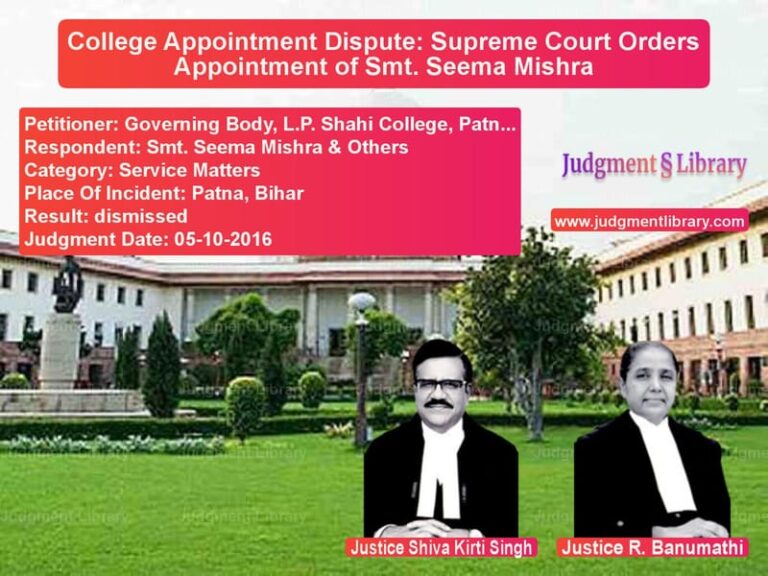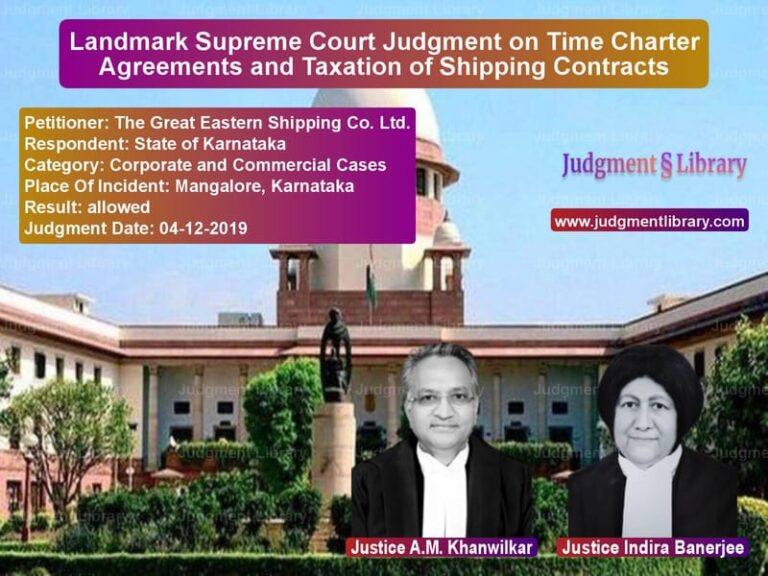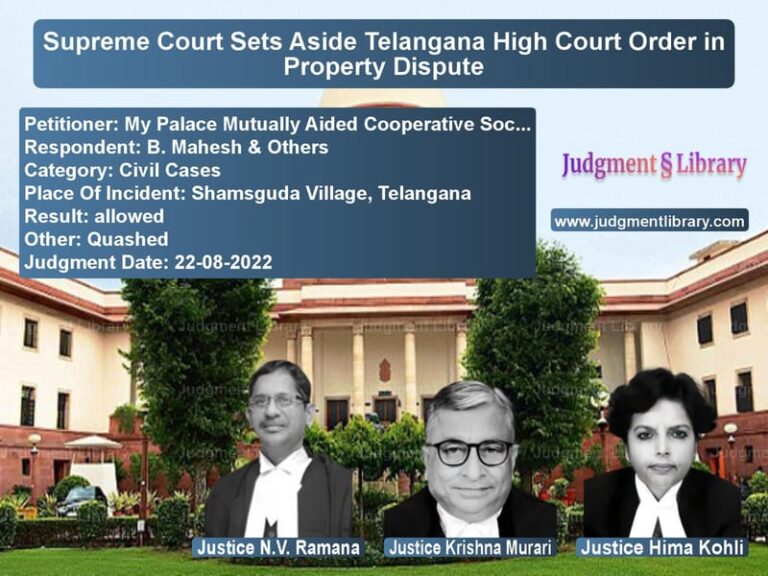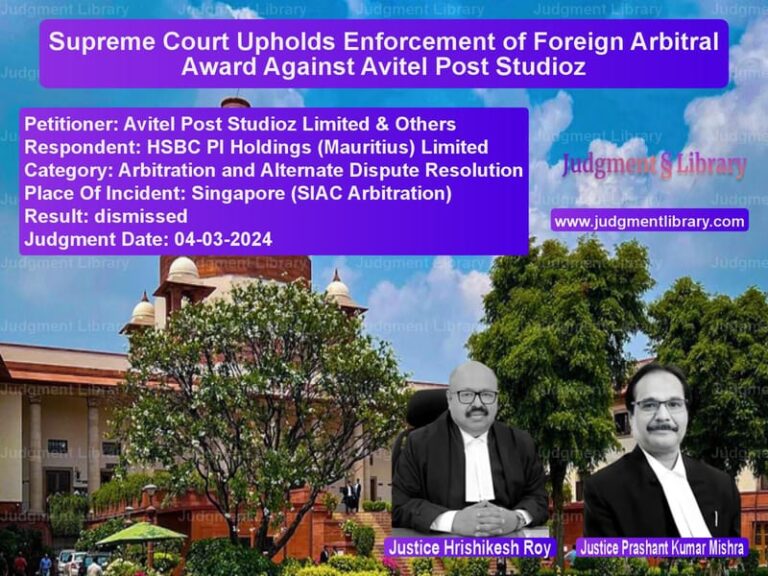Land Encroachment and Property Rights: Supreme Court Upholds Demolition Order
The Supreme Court of India recently delivered a significant judgment in Baini Prasad (D) Thr. LRs. vs. Durga Devi, addressing a long-standing dispute over land ownership, encroachment, and the rights of property owners. The case, which originated from Himachal Pradesh, revolved around a property dispute where the defendant (appellant) had allegedly encroached upon land owned by the plaintiff (respondent) and constructed a structure. The Supreme Court upheld the trial court’s decision to demolish the unauthorized construction and restore possession to the rightful owner.
Background of the Case
The dispute began with the plaintiff, Durga Devi, filing Civil Suit No.70 of 1988 in the Subordinate Judge’s Court, Kullu, seeking possession of 11 Biswancies of land. She alleged that the defendant, Baini Prasad, had unlawfully encroached upon her property, constructed a structure on it, and refused to vacate. Along with possession, she also sought a prohibitory injunction to prevent further interference with her property.
The trial court ruled in favor of Durga Devi, declaring her the rightful owner of the disputed land and ordering the demolition of the structure erected by the defendant. However, the defendant appealed the decision, leading to modifications by the First Appellate Court, which granted compensation instead of ordering demolition. Unhappy with this decision, the plaintiff filed a Second Appeal before the Himachal Pradesh High Court.
High Court’s Judgment
The High Court reinstated the trial court’s ruling, overturning the First Appellate Court’s decision. The court held that Durga Devi was entitled to the recovery of her land rather than mere compensation. The defendant, dissatisfied with this decision, approached the Supreme Court.
Arguments by the Appellant (Defendant)
- The appellant claimed that the respondent had acquiesced to the encroachment by not raising objections in time, thus barring her from seeking possession.
- He argued that he had constructed the structure under the bona fide belief that the land was his and thus should be protected under Section 51 of the Transfer of Property Act, 1882.
- He contended that he had invested time and resources in constructing the structure and that demolishing it would be unfair.
- He further argued that compensation should be the only remedy, as he had acted without malicious intent.
Arguments by the Respondent (Plaintiff)
- The respondent contended that she had repeatedly objected to the encroachment and had even sent a telegraphic notice to stop construction.
- She argued that the encroachment was deliberate and illegal and that allowing it to continue would set a dangerous precedent.
- The principle of estoppel did not apply, as she had actively opposed the encroachment.
- The judgment of the First Appellate Court was flawed as it prioritized the interests of an encroacher over the rights of a lawful property owner.
Supreme Court’s Observations and Judgment
The Supreme Court examined the case thoroughly and ruled in favor of Durga Devi, dismissing the appeal filed by Baini Prasad’s legal heirs. The Court observed:
“The concurrent findings of the courts below establish that the respondent is the rightful owner of the land and the appellant is an encroacher. No principle of equity can justify allowing a trespasser to retain unlawful possession.”
The Court further noted that Section 51 of the Transfer of Property Act did not apply to the appellant’s case, stating:
“In order to claim protection under Section 51, the appellant must have been a transferee under a defective title acting in good faith. Here, the appellant was a mere encroacher with no legitimate claim to the land.”
Regarding the argument of acquiescence, the Court stated:
“Mere delay in initiating legal proceedings does not constitute acquiescence. The respondent had actively objected and pursued legal remedies within the prescribed limitation period.”
Key Takeaways from the Judgment
- Property rights are paramount: A rightful owner cannot be forced to accept compensation in lieu of possession unless explicitly provided by law.
- Encroachment is illegal: Unauthorized occupation of another’s land, even in good faith, does not grant any legal rights to the encroacher.
- Legal action is crucial: Property owners must promptly challenge encroachments, but minor delays do not amount to a waiver of rights.
- Compensation is not always an option: Courts will not automatically substitute compensation for possession unless the case demands it under exceptional circumstances.
Implications of the Judgment
This decision reinforces the principle that landowners have an absolute right to reclaim their property from unlawful encroachers. The ruling sends a strong message that the judiciary will not tolerate land-grabbing and that encroachers cannot expect to buy their way out of legal trouble through compensation.
Conclusion
The Supreme Court’s decision in this case affirms that property rights are sacrosanct and that unauthorized encroachments cannot be legitimized through compensation. The ruling provides clarity on the application of Section 51 of the Transfer of Property Act and strengthens the legal framework protecting landowners. The case serves as an important precedent for future disputes related to land encroachment and ownership rights.
Petitioner Name: Baini Prasad (D) Thr. LRs..
Respondent Name: Durga Devi.
Judgment By: Justice B.R. Gavai, Justice C.T. Ravikumar.
Place Of Incident: Kullu, Himachal Pradesh.
Judgment Date: 02-02-2023.
Don’t miss out on the full details! Download the complete judgment in PDF format below and gain valuable insights instantly!
Download Judgment: baini-prasad-(d)-thr-vs-durga-devi-supreme-court-of-india-judgment-dated-02-02-2023.pdf
Directly Download Judgment: Directly download this Judgment
See all petitions in Property Disputes
See all petitions in Landlord-Tenant Disputes
See all petitions in Judgment by B R Gavai
See all petitions in Judgment by C.T. Ravikumar
See all petitions in dismissed
See all petitions in supreme court of India judgments February 2023
See all petitions in 2023 judgments
See all posts in Civil Cases Category
See all allowed petitions in Civil Cases Category
See all Dismissed petitions in Civil Cases Category
See all partially allowed petitions in Civil Cases Category







